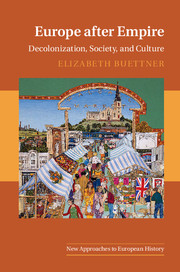Book contents
- Frontmatter
- Contents
- List of figures
- Acknowledgements
- Introduction
- Part I Decolonization for colonizers: Europe's transition to the postcolonial era
- 1 Myths of continuity and European exceptionalism: Britain, decolonization, and the Commonwealth family ideal
- 2 Occupation, resistance, and liberation: the road to Dutch decolonization
- 3 Soldiering on in the shadow of war: decolonizing la plus grande France
- 4 Long live the king? Belgium, the monarchy, and the Congo between the Second World War and the decolonization years
- 5 From rose-coloured map to Carnation Revolution: Portugal's overseas amputations
- Part II Migrations and multiculturalisms in postcolonial Europe
- Part III Memories, legacies, and further directions
- Epilogue: thoughts towards new histories of contemporary Europe
- Bibliography
- Index
4 - Long live the king? Belgium, the monarchy, and the Congo between the Second World War and the decolonization years
from Part I - Decolonization for colonizers: Europe's transition to the postcolonial era
Published online by Cambridge University Press: 05 June 2016
- Frontmatter
- Contents
- List of figures
- Acknowledgements
- Introduction
- Part I Decolonization for colonizers: Europe's transition to the postcolonial era
- 1 Myths of continuity and European exceptionalism: Britain, decolonization, and the Commonwealth family ideal
- 2 Occupation, resistance, and liberation: the road to Dutch decolonization
- 3 Soldiering on in the shadow of war: decolonizing la plus grande France
- 4 Long live the king? Belgium, the monarchy, and the Congo between the Second World War and the decolonization years
- 5 From rose-coloured map to Carnation Revolution: Portugal's overseas amputations
- Part II Migrations and multiculturalisms in postcolonial Europe
- Part III Memories, legacies, and further directions
- Epilogue: thoughts towards new histories of contemporary Europe
- Bibliography
- Index
Summary
In mid-1955, Belgium's media was abuzz with the story of a young man's first trip to Central Africa. Departures for the Congo were nothing new: ships sailed regularly between the ports of Antwerp and Matadi, carrying colonial administrators, missionaries, officers, businessmen, settlers, and their families between metropole and colony. Whether or not they themselves were part of the colonial community or personally knew others who were, by the 1950s many Belgians were familiar with the seaborne colonial rites of passage of European departures and African arrivals, if only through the comic book hero Tintin and his small white dog Milou (Snowy), whose global misadventures had famously taken them to the colony in Tintin au Congo in 1930. Subsequently reissued with some revision and new colour illustrations soon after the Second World War, Tintin's journeys as a 16-year-old ‘boy reporter’ grew even better known in the 1950s than when Georges Remi (known as Hergé) first drew him, enhancing his status as a national icon and cult figure – a position he maintains to this day despite recurrent controversies concerning the strips’ anti-Semitic and racist content. But in 1955, the traveller in question was neither the standard-issue colonial representative nor a figure as beloved as Tintin: he was none other than King Baudouin I, making his first royal tour of the Congo and Rwanda-Burundi at the age of 25. And unlike most ordinary Belgians setting off for Africa (and extraordinary ones like Tintin and Milou), King Baudouin went not by ship but on a state-of-the-art aircraft via Sabena, Belgium's national airline.
Baudouin's tour of his nation's Central African territories was intended to turn the page on one of the most challenging and divisive periods in Belgian history. Just as in 1914, Belgium suffered another wartime German invasion in 1940. King Léopold III (Baudouin's father) capitulated after only eighteen days, surrendering the army without the elected government's consent. Unlike the British royal family who famously toughed out the war years in London and unlike Queen Wilhelmina of the Netherlands who went into London exile when her country was occupied and later returned home in triumph, the Second World War did not ultimately emerge as Léopold III's finest hour or enhance his reputation.
- Type
- Chapter
- Information
- Europe after EmpireDecolonization, Society, and Culture, pp. 163 - 189Publisher: Cambridge University PressPrint publication year: 2016

